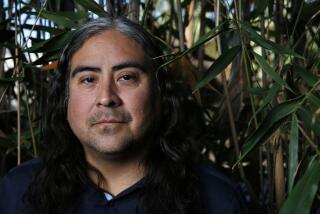Music Reviews : Trumpeter David Bilger in Ambassador Recital
- Share via
Pity the poor trumpet recitalist; his repertory is meager in size as well as substance. Trumpeters, if they wish to avoid transcriptions, must rely almost exclusively on the second- and third-rate attempts of lesser composers.
Still, a strong advocate can raise this music above its weaknesses. But trumpeter David Bilger--a co-principal in the Dallas Symphony--revealed no such special virtue as a soloist Monday night at Ambassador Auditorium, and despite his solid craftsmanship his recital remained steadfastly earthbound.
Best served was the dependable Sonata by Halsey Stevens, a trumpet standard, with its Copland harmonies and Stravinsky rhythms. Bilger gave it a relaxed, richly toned account. Also enjoyable was the concluding piece on the program, Herbert L. Clarke’s “The Carnival of Venice,” a turn-of-the-century display piece which Bilger, performing here on cornet, dispatched with acrobatic ease.
Throughout the evening pianist Linda Booth seconded Bilger’s efforts, but they consistently proved indifferent collaborators, separate musicians just playing their parts.
The repetitive, bland Caprice by Joseph Turrin opened the concert followed by Georges Enesco’s mildly engaging, impressionistic Legende, both in straightforward run-throughs. The brash Sonata, Opus 1, by Peter Maxwell Davies came off tamely, with Bilger and Booth more concerned with correct execution than dramatic statement. Bilger’s own transcriptions of two Mahler songs, “Fruhlingsmorgen” and “Erinnerung,” received mundane readings.
The premiere of Reynoldo Oachoa’s “Stills in Black and White,” a conservative, academic exercise in spacey lyricism, rounded out the program.
More to Read
The biggest entertainment stories
Get our big stories about Hollywood, film, television, music, arts, culture and more right in your inbox as soon as they publish.
You may occasionally receive promotional content from the Los Angeles Times.










